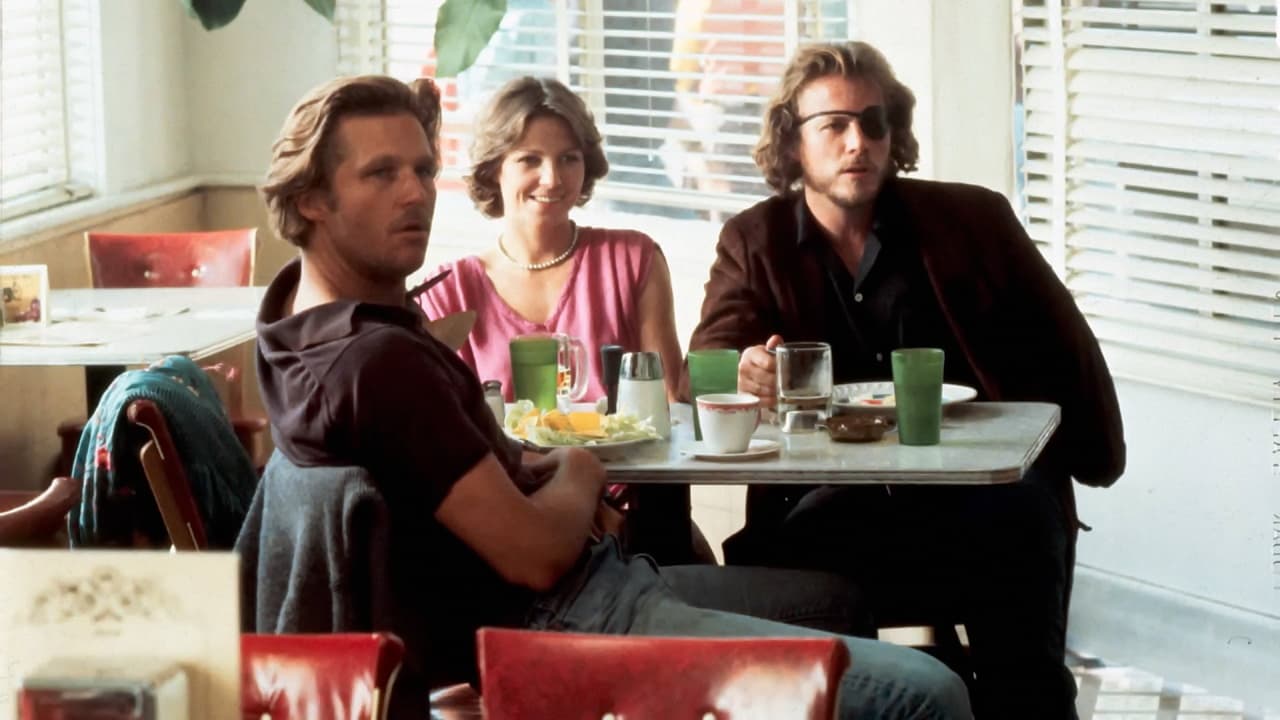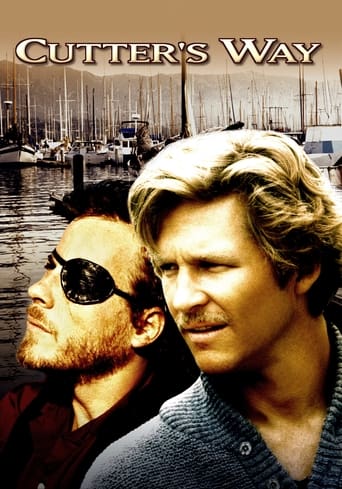

This adaptation of the Newton Thornburg novel "Cutter and Bone" stars Jeff Bridges, John Heard, and Lisa Eichhorn in its principal roles. It's a sad, cynical story of friendship and loss, in a post- Vietnam, post-Watergate America. Bridges is Richard Bone, an unambitious but likable young stud currently earning a living as a yacht salesman. Heard is his friend Alex Cutter, a bitter, confrontational, and disabled veteran. And Eichhorn is Maureen, the despairing alcoholic whom they both love. One night, when his car breaks down in an alley, Richard sees a man disposing of a body. That man just might be filthy rich J.J. Cord (Stephen Elliott), and Alex relentlessly prods Richard into doing something with this knowledge."Cutter's Way" is more of a character study than anything else, taking a blunt, unflinching look at our three flawed protagonists. Cutter bemoans the lack of "heroes" in the world, and doesn't approve of the way that Bone avoids commitments. Maureen doesn't get much love or affection from her husband Cutter, and finds herself drawn to the more easygoing Bone. All three of the leads are impressive, especially Eichhorn. But it's often Heard that steals the show; his Cutter is a force of nature much of the time, although the character is not without humanity.Czech-born director Ivan Passer gives us a film that is noticeably low key and slowly paced, so it won't appeal to all tastes. The main draw really is the acting, although it's commendable that the story isn't patently predictable. It's up to us to decide if Cord really is guilty of the crime.The offbeat music score by Jack Nitzsche (reminiscent of his music for "One Flew Over the Cuckoo's Nest" at times) and the gorgeous photography of various Santa Barbara locations are a big plus. Also among the supporting cast are Ann Dusenberry, Arthur Rosenberg, and Nina van Pallandt; look for Billy Drago in a bit as a garbageman.Fairly compelling stuff, with some truly sobering moments.Seven out of 10.
... View MoreCutter's Way is not a perfect film, it meanders at a leisurely pace. The murder mystery is at times a backdrop as we look at a dysfunctional trio living in Santa Barbara in the late 1970s/early 1980s. Parts of the own is still seedy, still a dump. We are yet to enter the excess and glamour of Reaganomics.Jeff Bridges plays gigolo and boat salesman Richard Bone whose car breaks down and he spots another car in the distance and what appears to be a figure dumping something into a large garbage bin. The car later wildly drives past him.The next day a woman's body is discovered and because Bone's car is nearby he is dragged in as a suspect.Alex Cutter is a one eyed, one legged, one armed Vietnam veteran left bitter and twisted after the war. An old buddy of Bone who is one of the few people willing to put up with Cutter's bile and drunken rages. When Bone points out an old wealthy man on a horse during a parade as a potential suspect Cutter is determined to go after his prey and teams up with the dead woman's sister to smoke the culprit out.Lisa Eichhorn is Cutter's abused, alcoholic wife washed out by him even though she loves him. She is the soul of the film as Cutter and Bone go out to catch their whale. She is not afraid to make barbed comments. The film explores the underbelly of America, yet the era is no different than today. Local oil magnate JJ Cord played by Stephen Elliott (famous for the banana sparring routine in Beverly Hills Cop) knows his wealth, influence and penchant for violence will protect him.This was an early performance by the late John Heard and simply one of his best film performances. It is a showy role with allusions to Moby Dick with Cutter as Ahab. Heard should have had a better film career rather than just be known as a careless dad leaving his son, Home Alone twice.Cutter's Way flopped at the box office when it was released. Despite the comments made by director Ivan Passer it is not really a surprise. It is a very anti commercial film that can leave some of its audience frustrated. Over the years it has gained a cult following.
... View MoreI think this movie is overrated, it's not at all "important". as some people seem to believe. It's not all bad though.I saw this in the theater when it originally came out and wasn't impressed much. The performances are fine, but there is something about it, even after seeing it probably six times over the years, that makes me not give a damn about it. Maybe it's just the general "downer" theme, I don't really know what it is. I'm not a young person who finds movies like "The Godfather" too slow, because they actually tell a story, but this movie seems way too long. Not worth watching again, I don't think I will suddenly say, "Wow, I missed that!", but worth watching at least once.
... View MoreCutter's way, aka Cutter and Bone is one of the finest films of the 80's and the finest mystery of that decade. It proves that the salvaged movies are usually treasure of the bunch, and thankfully this movie was saved from oblivion to become a cult classic. One doesn't know where to start with all that works for this cinematic diamond, there are finest performances all around, especially by Heard and Lisa Eichhorn, who mesmerized me with her portrayal of burnt-out wife with loads of existential sorrow and honesty, which she radiates all around her, like a halo, along with beauty from within her troubled soul. The story is well written and the dialogs are great.Czech school of directing always blended well with Hollywood, when Hollywood was about art and not sales, and we have numerous examples of that through the works of Milo Forman, Karel Reisz and finally Ivan Passer. He directs this film with a sense for bringing out the best from each of the principal characters who are all lost souls, wandering through the wasteland of their lives. Jordan Cronenweth's masterful photography that makes this film look 10 years ahead of it's time, only add to the overall beauty. If you can, be sure not to miss this one. Fantastic.
... View More